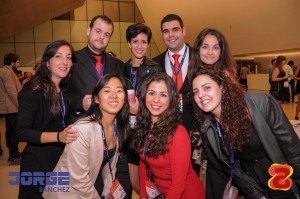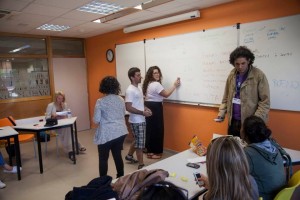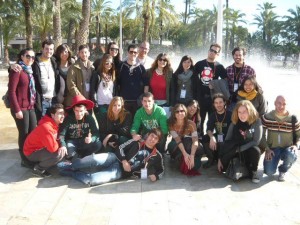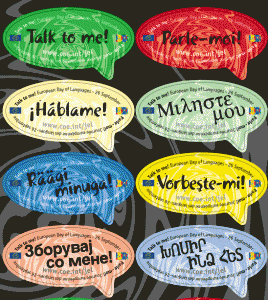Recently, the Language Working Group (LWG) started a project aimed at improving the level of English in publications of AEGEE. It’s called “Lingua” and offers a high quality translating and proofreading service to the whole Network. The AEGEEan interviewed the three initiators of the project, Adri López Smith, Isabel Sodric and Carlota Lifante to hear more about the idea and how this service works. These ‘three musketeers’ are working on splitting the different tasks at the moment, after the sending of an Open Call to the AEGEE-L mailing list, which resulted in a lot of people have already showing interest in getting involved.

The AEGEEan: Who came up with the idea of creating a pool of translators and proofreaders?
Adri- When I entered in the board of the LWG, I realized that there were some professional translators/interpreters and I told myself: why don’t we take advantage of this high-quality human resource to help locals with translations? A few days later, during ZarAgora, Isa and Carlota, after having seen some English mistakes in AEGEE’s official documents, approached me with a similar question: why don’t we try to improve the quality of external documents in AEGEE? Then I just tried to mix both ideas.
Carlota- I co-organized a congress at the faculty of Arts of the University of Alicante based on translators’ visibility. After that, Miguel Gallardo (Comité Directeur) told me I could contribute to a new point of view which would be very useful in the LWG. There were so many professional translators there and after chewing over it, Isa and I realized during ZarAgora that it would be such a great challenge for us to create and coordinate these translators. We could provide a high-quality service of translation and proofreading with the intention of reflecting a greater professionalism in the association. And, of course, we would need a third Musketeer who help us to win over some adversities.

What is the exact idea behind the project?
Carlota- The main idea is, while promoting a borderless, communicative and cooperative association, to offer a professional multilingual image and reflect the commitment of its members, who are making a great effort in order to carry out a Europe for youth.
Isa – I see this project as a way of taking care of the image of the association. In the same way that others have helped to show the world what AEGEE is by designing logos, websites or taking professional pictures, we can help as far as language is concerned to reach a higher quality in AEGEE documents.
Why are you personally interested in the topic?
Adri – Because I want to support antennae with a lower language knowledge.
Carlota – I grew up surrounded by translations, words, books, texts and languages and I learnt to appreciate all of this at a very young age. So when I was younger, whereas some dreamt of becoming a doctor, a firefighter or a singer, I dreamt of becoming an interpreter or, at least, a translator. Multiculturalism has gone with me all my life and the fact is that I do love what I do.
Why do you think this is important for AEGEE?
Carlota – As a vocational Translation and Interpreting student and as a (wannabe) translator and proofreader, I am very concerned with everything which is related to communication between cultures and cultural mediation issues. In order to provide a high-quality communication, you need professionals who are able to transfer the message properly. AEGEE is a European association and the professionalism of its members -who are working so hard in order to move forward- is (and it should be) deduced to every aspect. Documents, web pages, articles, e-books, presentations, Power Points, brochures and so on, are the main sources that reach the rest of the world, so these should reflect our competence, professionalism and expertise.
How do you plan to find and motivate proofreaders and translators to take part in the project?
Adri- From a formal point of view, this is the kind of work that a translator in training could add to their CV and therefore, this experience would be worth it for the rest of her/his professional career. So they should automatically be interested.
Carlota- And we will create a know-how manual in order to support members who are not professional translators or students of Translation to become familiar with word-processing tasks as well. They will have the opportunity to learn from people who are more experienced and to apply their knowledge in a practical way. In addition, we will also provide a record of the work each person manages based on the points below, so that people can be aware of their tasks, and so they have a clear overview of what they could put on therir CV.
1. Task Title (name of the document to translate or to proofread)
2. Task Type (translation or proofreading)
3. Source (source language)
4. Target (target language)
5. Word Count (translated words)

What are the next steps in the project?
Adri – Right now we are in the middle of the recruitment process (we already have more than 50 people!), but if you feel like being part of this team, do not hesitate to fill this questionnaire and we will contact you! We are also collaborating with The AEGEEan proofreaders and we are creating a manual or guideline (a know-how document) with some tips on translation/proofreading. Once all this is finished, we will inform all the Network on how this service is going to be operating exactly.
Carlota- There will come another Open Call to gather more interested translators and proofreaders, with a separation attending to working languages, and a distribution of translation and proofreading tasks. All AEGEEans want to translate or to proofread concerning AEGEE issues will always be welcomed. In addition, perhaps we will start a collaboration with current projects as I was talking to some of the project managers at the fair during the ZarAgora and they were pretty interested in translating their coming projects into several languages.
It will be interesting to follow this idea by the Language Working Group and Carlota ends the interview asking “Maybe it could be even a good initiative in order to attract new (translators or proofreaders) members to the association. Who knows?”
Written by Patricia Anthony, AEGEE-København


